Why are we reading if not in hope of beauty laid bare,
life heightened and its deepest mystery probed?
Annie Dillard, The Writing Life
This is just one of many quotes about reading or writing I sometimes share when doing talks about what books can do, why we should read (fiction or non-fiction) and the benefits of the reading life.
It was with great anticipation and a little trepidation that I prepared to (remotely) address a San Francisco Bay Area writers group—fiction writers, no less! I’ve addressed all manner of adults and children on the role of reading, but only a few times have I addressed actual writers about their own creative calling and craft. (I still recall fondly when a group of mostly seasoned journalists humored me as I tried to inspire them in their own vocation as reporters and writers.)
I’ve done some classes using teleconference technologies before but I was still nervous about whether Zoom would work (it didn’t; I won’t bore you with the glitchy details) but being with a chapter of the Association of Christian Fiction Writers was an honor and a thrill; like I said, though, I was nervous. It’s one thing to talk to book lovers about reading, but what did I have to say to real authors working on their novels? Some had even published books already, most were working on manuscripts. Although we stock a lot of so-called “Christian fiction” I have to admit I don’t read many of the stories from these evangelical publishers (and, I’ll admit it, I judge way too many of those books by their formulaic covers.) I’m not much of a fan of speculative fiction or fantasy, let alone science fiction, so, well, I was hoping I could offer some words of wisdom to help them reflect on their calling as writers.
Or at least I could remind them that we booksellers (and the many book buyers that count on us) appreciate their hard work. It’s a self-evident quip, but needs said: without writers writing books this whole publishing industry wouldn’t exist. We sell ‘em, but they write ‘em. Thanks be to God.
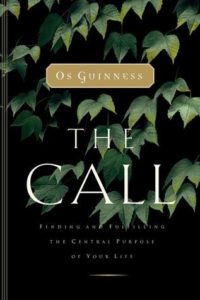 When in doubt, I often start with a passionate summary of the doctrine of vocation, talk about Os Guinness’s stellar and exquisite work The Call: Finding and Fulfilling Your Life’s Greatest Purpose (Word; $17.99) and remind folks that their work or avocations are as important to the Kingdom of God as is the work of ministers or missionaries. Explaining how the early church was wrong to so easily buy into Plato’s lie that life is made up of what some call “sacred and secular” spheres is a good way to start almost any talk on any topic. God cares, the world matters, we are called to reflect on the principles and practices that cohere with the actual way God’s good world really works, illumined by the light of Biblical truth. Citing that explosive verse about “taking every theory captive” (2 Corinthians 10:5) it’s helpful, I think, to remind folks to think well about what they do.
When in doubt, I often start with a passionate summary of the doctrine of vocation, talk about Os Guinness’s stellar and exquisite work The Call: Finding and Fulfilling Your Life’s Greatest Purpose (Word; $17.99) and remind folks that their work or avocations are as important to the Kingdom of God as is the work of ministers or missionaries. Explaining how the early church was wrong to so easily buy into Plato’s lie that life is made up of what some call “sacred and secular” spheres is a good way to start almost any talk on any topic. God cares, the world matters, we are called to reflect on the principles and practices that cohere with the actual way God’s good world really works, illumined by the light of Biblical truth. Citing that explosive verse about “taking every theory captive” (2 Corinthians 10:5) it’s helpful, I think, to remind folks to think well about what they do.
I wish the teleconferencing technology had worked better because some good back-and-forth dialogue about this would have been interesting. I invited them – as I have when I’ve addressed artists, before – to consider that one of the big topics that writers must grapple with is what they believe about the creative process itself. Too often, I think, Christian folks have too easily adopted perspectives about how imagination and creativity works without adequate philosophical reflection on the assumptions and consequences of those particular theories of creativity.
Don’t get me wrong: when a writer is revising a plot, or revising a sentence, she isn’t at that point pondering the deepest a priori attitudes or ethos of the MFA program she was a part of, or what is acceptable from a Biblical viewpoint about the proposals in, say, Julia Cameron’s beloved The Artists Way: A Spiritual Path to Greater Creativity (Tarcher; $17.00) or the philosophical-linguistic assumptions in Strunk and White. But at some point, we must. I think it hinders our Christian integrity and diminishes our gifts offered to the world when we don’t think Christianly about our work and think we can get by through “winging it” or adopting as gospel any popular author or theory that’s in vogue. (Just for an easy example, I have recommended more than a few times the truly fascinating book by the charming Elizabeth Gilbert called Big Magic Creative Living Beyond Fear (Riverhead; $16.00) but the way she suggests that “the muse” is maybe an actual being is, well, wacky at best. What should we think about this? Ought we to fall prey to talk about muses and whatnot? Where is that coming from?)
I suggested that when a lawyer is arguing her case, she isn’t at that moment thinking about the details of her jurisprudences classes as an L1 law student. (Hat tip to you, Kelley Way, lawyer and writer!) Counselors, scientists, businesspeople, parents, teachers, and nurses, are significantly influenced by the deep ideas they’ve come to adopt (from study in the classroom or from their mentors or from popular culture) and don’t always think about those theories in the moment of their daily practice; they are subconsciously assumed, lived out, like it or not. But at some point they should buy some Christian books and be intentional about thinking through just what they believe about the foundational matters in their field.
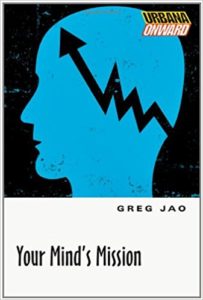 If this task or way of thinking about the intellectual implications of passages like 2 Corinthians 11:5 or Romans 12:1-2, I highly recommend at least reading up a bit on the Christian mind. My favorite brief book on this is by the wonderful Greg Jao and is called Your Mind’s Mission (IVP; $7.00.) I very briefly describe in an older BookNotes ten others in a list that’s a little dated but may proof helpful. We still stock these, and more, so check it out here.
If this task or way of thinking about the intellectual implications of passages like 2 Corinthians 11:5 or Romans 12:1-2, I highly recommend at least reading up a bit on the Christian mind. My favorite brief book on this is by the wonderful Greg Jao and is called Your Mind’s Mission (IVP; $7.00.) I very briefly describe in an older BookNotes ten others in a list that’s a little dated but may proof helpful. We still stock these, and more, so check it out here.
For writers, this includes thinking about art and creativity (long before you get to the questions of marketing and promotion, which carry their own set of intellectual and practical, spiritual challenges.) Which leads, sooner rather than later, to the thorny topic of aesthetics.
Whether one is writing a romance or a YA graphic novel, working in speculative fiction, or researching a historical piece, writing a bone fide horror novel or a cozy mystery, one’s work needs to be grounded in some basic assumptions about how God’s world of writing works, and what the creative process is all about. And, by the way: I don’t know what “literary fiction” is and reject any notion that only those writing high-brow, sophisticated novels have to consider aesthetic theory and deeper questions about the nature of creativity and story.
A FEW THAT MIGHT BE HELPFUL IN ESTABLISHING THIS FOUNDATIONAL FRAMEWORK
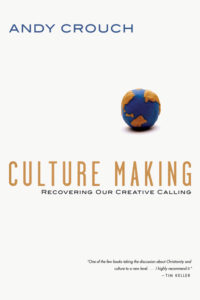 Culture Making: Recovering Our Creative Calling Andy Crouch (IVP) $22.00 Time and again I insist this is not a book for artists but for all of us, for any who long to be more meaningful engaged in the human task of culture-making, of stewarding the gifts God has given us for the common good. We are all called to make something out of what we are given and this image-of-God work of cultivating God’s garden is intrinsically human. So, yes, it is for butchers, bakers, and candlestick makers, for parents and politicians and practitioners of all sorts. But, let’s face it: who needs to have language to express this stuff, this good, creative calling, this longing to leave a legacy of something real, than those called to be artists, writers, poets, novelists? I very, very highly recommend this one-of-a-kind book.
Culture Making: Recovering Our Creative Calling Andy Crouch (IVP) $22.00 Time and again I insist this is not a book for artists but for all of us, for any who long to be more meaningful engaged in the human task of culture-making, of stewarding the gifts God has given us for the common good. We are all called to make something out of what we are given and this image-of-God work of cultivating God’s garden is intrinsically human. So, yes, it is for butchers, bakers, and candlestick makers, for parents and politicians and practitioners of all sorts. But, let’s face it: who needs to have language to express this stuff, this good, creative calling, this longing to leave a legacy of something real, than those called to be artists, writers, poets, novelists? I very, very highly recommend this one-of-a-kind book.
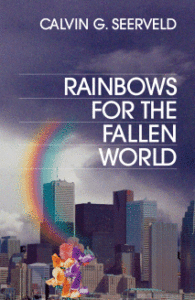 Rainbows for the Fallen World Calvin Seerveld (Toronto Tuppence Press) $30.00 In my presentation I explained a bit about this important book, on of my own personal all time favorites, especially the early chapters about how Seerveld reminds us, helps disclose for us, the aesthetic dimension to all of life. Here he does his most famous and often-discussed good work on “allusion” and a serious chapter or two on the philosophy of aesthetics. I’d read anything Cal writes – and what an energetic writer he is! For those who want a deep dive into his work, see any of these in this six-volume set which I describe HERE.
Rainbows for the Fallen World Calvin Seerveld (Toronto Tuppence Press) $30.00 In my presentation I explained a bit about this important book, on of my own personal all time favorites, especially the early chapters about how Seerveld reminds us, helps disclose for us, the aesthetic dimension to all of life. Here he does his most famous and often-discussed good work on “allusion” and a serious chapter or two on the philosophy of aesthetics. I’d read anything Cal writes – and what an energetic writer he is! For those who want a deep dive into his work, see any of these in this six-volume set which I describe HERE.
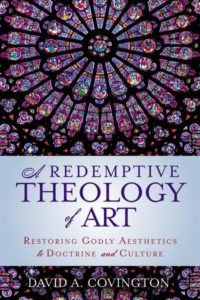 A Redemptive Theology of Art: Restoring Godly Aesthetics to Doctrine and Culture David A. Covington (Zondervan) $24.99 This is very new and I applaud Zondervan for releasing a book that, sadly, may not seem important to those who read theology. I’m part way through it want to commend the author for doing this kind of good work. It looks at how aesthetics can influence our understanding of doctrine as well as our engagement with the culture and the creative process. Good, good stuff. He quotes Seerveld, too.
A Redemptive Theology of Art: Restoring Godly Aesthetics to Doctrine and Culture David A. Covington (Zondervan) $24.99 This is very new and I applaud Zondervan for releasing a book that, sadly, may not seem important to those who read theology. I’m part way through it want to commend the author for doing this kind of good work. It looks at how aesthetics can influence our understanding of doctrine as well as our engagement with the culture and the creative process. Good, good stuff. He quotes Seerveld, too.
Noel Paul Stookey (yes of PPM fame) notes that this book reminds us of how aesthetics is related to adoration and love. And how “this book is a heartfelt reminder to seek out the redemptive quality in everything we do.”
My friend Bill Edgar of Westminster Theological Seminary, who is an excellent guide to this stuff in his own books, says:
David Covington has given us a remarkable window onto the Bible’s take on aesthetics. He gently but firmly deflates adages such as “beauty is in the eye of the beholder” and other subjective judgments, but without demeaning the spirit from which they are generated. A thoroughly elevating read.
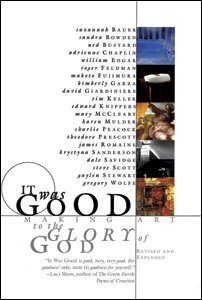
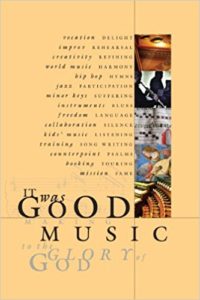
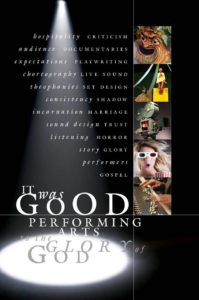 It Was Good: Making Art to the Glory of God edited by Ned Bustard (Square Halo Books) $24.99
It Was Good: Making Art to the Glory of God edited by Ned Bustard (Square Halo Books) $24.99
It Was Good: Making Music to the Glory of God edited by Ned Bustard (Square Halo Books) $24.99
It Was Good: Performing Arts to the Glory of God edited by Ned Bustard (Square Halo Books) $19.99
All three of these excellent collection of thoughtful essays are simple stellar and I recommend all three, truly. Each includes fabulous essays by dozens of thoughtful theorists and artists, practitioners and patrons, writers and thinkers, makers and performers. We are so proud to stock these (and everything else this classy niche publisher does.) The first is obviously most foundational; the second is for anyone who enjoys music (or is involved in music-making) which the new, third one is for dancers, actors, film-makers, and others in the active, performing arts. See our previous BookNotes observations about these three here, here, or here, and order from us today at our 20% off offer. Check out the Square Halo Books website, here.
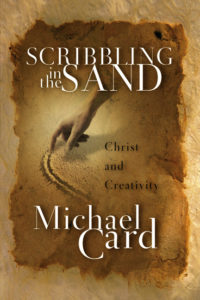 Scribbling in the Sand: Christ and Creativity Michael Card (IVP) $17.00 There are heavier books out there, but I really, really like Mike’s mature reflections and balanced call to embrace some degree of creativity in our daily lives. This is helpful for artists and writers, but also good for anyone. We recommend it often.
Scribbling in the Sand: Christ and Creativity Michael Card (IVP) $17.00 There are heavier books out there, but I really, really like Mike’s mature reflections and balanced call to embrace some degree of creativity in our daily lives. This is helpful for artists and writers, but also good for anyone. We recommend it often.
I love what Michael writes about the famous incident with Jesus writing in the dirt: “It was art and it was theater at the same time, but it was more. It was what he did not say that spoke most powerfully to the mob that morning.”
Interestingly, but well deservedly, Scrdibbling in the Sand was voted 2002 Publisher’s Weekly Best Adult Religion Book of the Year!
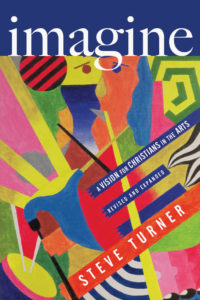 Imagine: A Vision for Christians in the Arts Steve Turner (IVP) $16.00 This is another standard go-to book for us that is basic, interesting, engaging for anyone whether filmmaker, musician, storyteller, or writer – or anyone who just enjoys the popular arts. I so appreciate this classic book, which was nicely expanded a few years back and often recommend it (to artists and others; maybe especially others.) Steve Turner is a respected rock critic (and has written widely on, among other musical icons, The Beatles.) This is a very good book, highly recommended.
Imagine: A Vision for Christians in the Arts Steve Turner (IVP) $16.00 This is another standard go-to book for us that is basic, interesting, engaging for anyone whether filmmaker, musician, storyteller, or writer – or anyone who just enjoys the popular arts. I so appreciate this classic book, which was nicely expanded a few years back and often recommend it (to artists and others; maybe especially others.) Steve Turner is a respected rock critic (and has written widely on, among other musical icons, The Beatles.) This is a very good book, highly recommended.
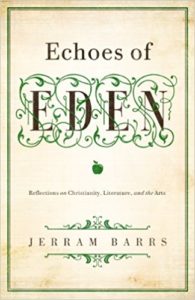 Echoes of Eden: Reflections on Christianity, Literature, and the Arts Jerram Barrs (Crossway) $18.99 When my friend Denis Haack says something good about a book, when jazzman and seminary prof William Edgar has a blurb (saying it is “enriching both professional artists and anyone else sensitive to the power of art for all of life”) and when Nicholas Perrin (once a teaching assistant to NT Wright) says that Barr “clears away the clutter of much-touted arguments and sets forth a clear framework for any Christian thinking Biblically about the arts” you know you’ve got my attention.
Echoes of Eden: Reflections on Christianity, Literature, and the Arts Jerram Barrs (Crossway) $18.99 When my friend Denis Haack says something good about a book, when jazzman and seminary prof William Edgar has a blurb (saying it is “enriching both professional artists and anyone else sensitive to the power of art for all of life”) and when Nicholas Perrin (once a teaching assistant to NT Wright) says that Barr “clears away the clutter of much-touted arguments and sets forth a clear framework for any Christian thinking Biblically about the arts” you know you’ve got my attention.
Wow — check out what Pastor Tim Keller says:
The most accessible, readable, and yet theologically robust work on Christianity and the arts that you will be able to find.
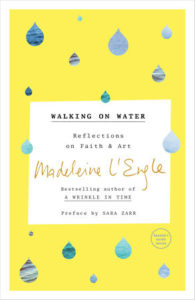 Walking on Water: Reflections on Faith and Art Madeline L’Engle (Convergence) $15.00 This is a must-read for any serious writer. Her take on the creative process and the spirituality of the arts is wise and a tad unusual – she draws on desert fathers and medieval artists and more. It is not simplistic. Of course, her main art work is as an author, so it’s very good for writers. There is, in this recently re-issued paperback, a lovely preface by the YA novelist Sara Zarr.
Walking on Water: Reflections on Faith and Art Madeline L’Engle (Convergence) $15.00 This is a must-read for any serious writer. Her take on the creative process and the spirituality of the arts is wise and a tad unusual – she draws on desert fathers and medieval artists and more. It is not simplistic. Of course, her main art work is as an author, so it’s very good for writers. There is, in this recently re-issued paperback, a lovely preface by the YA novelist Sara Zarr.
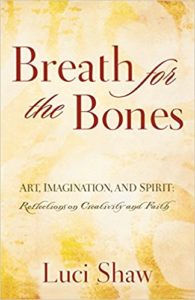 Breath for the Bones: Art, Imagination, and Spirit: Reflections on Creativity and Faith Luci Shaw (Thomas Nelson) $15.99 Luci Shaw (or was good friends and prayer partner with Madeline L’Engle, by the way) is a very esteemed Christian literary figure, a poet and nonfiction essayist, spiritual leader and storyteller. (She has a new book of poetry coming from Paraclete Press this fall!!) This is a book that should be on every aspiring writers shelves, maybe on your nightstand. She knows good writing – from Emily Dickinson to Annie Dillard – she reflects on the meaning of symbolism and metaphor and shows how good art (mostly good writing since that is her particular specialty) can help humans flourish and even experience God. Very nicely done and very inspiring.
Breath for the Bones: Art, Imagination, and Spirit: Reflections on Creativity and Faith Luci Shaw (Thomas Nelson) $15.99 Luci Shaw (or was good friends and prayer partner with Madeline L’Engle, by the way) is a very esteemed Christian literary figure, a poet and nonfiction essayist, spiritual leader and storyteller. (She has a new book of poetry coming from Paraclete Press this fall!!) This is a book that should be on every aspiring writers shelves, maybe on your nightstand. She knows good writing – from Emily Dickinson to Annie Dillard – she reflects on the meaning of symbolism and metaphor and shows how good art (mostly good writing since that is her particular specialty) can help humans flourish and even experience God. Very nicely done and very inspiring.
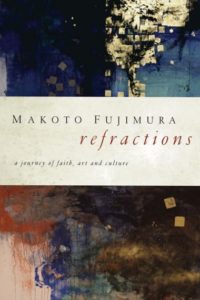 Refractions: A Journey of Faith, Art and Culture Makoto Fujimura (NavPress) $24.99 We stock and highly recommend all of Mako’s extraordinary books; there is a reason he is so well respected in so many quarters. As an abstract painter living near Ground Zero during 9-11 his ruminations on the arts have a poignant, socially responsible tone. These are beautiful essays, cries from the heart of a lively, thoughtful, Christian artist. I hope you know his many other books, from the broad and thoughtful Culture Care: Reconnecting with Beauty for our Common Life to Silence and Beauty: Hidden Faith Born of Suffering the specific, award-winning study of the classic Japanese novel, Silence, which raises huge questions about how art can be helpful as we live in a hurting world. We talked about this matter somewhat in the writers group – that good books can help heal the world. Silence and Beauty shows us how it’s done. But I think his Refractions is a must-have book.
Refractions: A Journey of Faith, Art and Culture Makoto Fujimura (NavPress) $24.99 We stock and highly recommend all of Mako’s extraordinary books; there is a reason he is so well respected in so many quarters. As an abstract painter living near Ground Zero during 9-11 his ruminations on the arts have a poignant, socially responsible tone. These are beautiful essays, cries from the heart of a lively, thoughtful, Christian artist. I hope you know his many other books, from the broad and thoughtful Culture Care: Reconnecting with Beauty for our Common Life to Silence and Beauty: Hidden Faith Born of Suffering the specific, award-winning study of the classic Japanese novel, Silence, which raises huge questions about how art can be helpful as we live in a hurting world. We talked about this matter somewhat in the writers group – that good books can help heal the world. Silence and Beauty shows us how it’s done. But I think his Refractions is a must-have book.
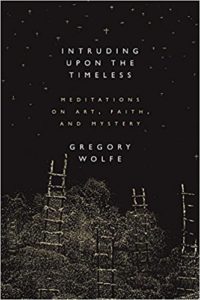 Intruding Upon the Timeless: Meditations on Art, Faith and Mystery Gregory Wolfe (Square Halo Books) $22.99 I think any literary person should know the exquisite and thoughtful prose of this well-informed Catholic leader in the movement – the space, as we say these days – relating faith and the arts. You should know the journal he founded, Image, his collection of essays entitled The Operation of Grace: Further Essays on Art, Faith, and Mystery, and a major work entitled Beauty Will Save the World: Recovering the Human in an Ideological Age. (You should know his wife, Suzanne’s, two excellent novels, too, The Confessions of X, about Augustine’s early lover and Unveiling, a revised, newly reissued novel about an art restoration project. But I digress.) This recent Square Halo edition of Intruding Upon the Timeless a collection of short, luminous, essays by Wolfe from Image was expanded last year and reissued with new artwork within, including some by woodcut artist Barry Moser. Very, very nicely done, and good reading for anyone in the arts, and certainly faith-based writers.
Intruding Upon the Timeless: Meditations on Art, Faith and Mystery Gregory Wolfe (Square Halo Books) $22.99 I think any literary person should know the exquisite and thoughtful prose of this well-informed Catholic leader in the movement – the space, as we say these days – relating faith and the arts. You should know the journal he founded, Image, his collection of essays entitled The Operation of Grace: Further Essays on Art, Faith, and Mystery, and a major work entitled Beauty Will Save the World: Recovering the Human in an Ideological Age. (You should know his wife, Suzanne’s, two excellent novels, too, The Confessions of X, about Augustine’s early lover and Unveiling, a revised, newly reissued novel about an art restoration project. But I digress.) This recent Square Halo edition of Intruding Upon the Timeless a collection of short, luminous, essays by Wolfe from Image was expanded last year and reissued with new artwork within, including some by woodcut artist Barry Moser. Very, very nicely done, and good reading for anyone in the arts, and certainly faith-based writers.
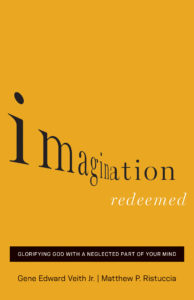 Imagination Redeemed: Glorifying God with a Neglected Part of Your Mind Gene Veith & Matthew Ristuccia (Crossway) $16.99 It is surprising that there are few books that are directly exploring the role of imagination in faith. There are a few that are a bit eccentric or obtuse, but this is clear and insightful. It is a good starting point towards a coherently Christian approach and has endorsements on the back by David Kim (of the Redeemer Presbyterian Center for Faith and Work), Jeremy Begbie (who, after Seerveld, may be one of the most important aesthetic theorists writing today) and the esteemed emeritus Wheaton literature prof Leland Ryken.
Imagination Redeemed: Glorifying God with a Neglected Part of Your Mind Gene Veith & Matthew Ristuccia (Crossway) $16.99 It is surprising that there are few books that are directly exploring the role of imagination in faith. There are a few that are a bit eccentric or obtuse, but this is clear and insightful. It is a good starting point towards a coherently Christian approach and has endorsements on the back by David Kim (of the Redeemer Presbyterian Center for Faith and Work), Jeremy Begbie (who, after Seerveld, may be one of the most important aesthetic theorists writing today) and the esteemed emeritus Wheaton literature prof Leland Ryken.
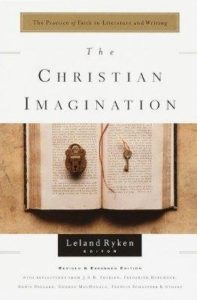 The Christian Imagination: The Practice of Faith in Literature and Writing Leland Ryken (Shaw Books) $24.99 Some say that this is an ideal book to use in a class on writing or literature, an anthology that brings together some of the very best stuff written on the integration of faith and literature. It is a bit dated and tends towards the classical, but for what it does it is an unparalleled anthology. In it you’ll find excerpts from C.S. Lewis, Flannery O’Conner, Dorothy Sayers, Frederick Buechner, and more… a good exercise for any writer is to dip into good writing and it is always worthwhile for anyone trying to develop their own opinions about creativity and aesthetics and the writing process to hear what great minds have said about this daunting topic. What a joy to have this thick paperback of 480 pages!
The Christian Imagination: The Practice of Faith in Literature and Writing Leland Ryken (Shaw Books) $24.99 Some say that this is an ideal book to use in a class on writing or literature, an anthology that brings together some of the very best stuff written on the integration of faith and literature. It is a bit dated and tends towards the classical, but for what it does it is an unparalleled anthology. In it you’ll find excerpts from C.S. Lewis, Flannery O’Conner, Dorothy Sayers, Frederick Buechner, and more… a good exercise for any writer is to dip into good writing and it is always worthwhile for anyone trying to develop their own opinions about creativity and aesthetics and the writing process to hear what great minds have said about this daunting topic. What a joy to have this thick paperback of 480 pages!
HERE ARE A FEW ABOUT THE CREATIVE PROCESS… ENJOY THEM, LEARN SOMETHING, AND, YET, AS ALWAYS, READ WITH DISCERNMENT
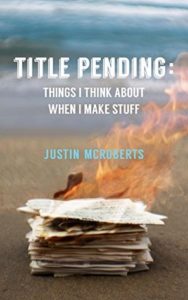 Title Pending: What I Think About When I Make Stuff Justin McRoberts (CreateSpace) $10.99 I told the San Fran Bay Area ACFW group that they should know Justin, a singer-songwriter, workshop leader, podcast genius, author and all-around cultural creative who lives out there. Title Pending is a little known self-published work by a guy I really, really respect which is full of advice and ideas about being creative. Congrats to Justin and his friend Scott “The Painter” Erickson who just signed a deal with Waterbrook. Yah. What do you think about when you make stuff? Maybe Justin’s insights can help you answer that, or give a better answer. Cool.
Title Pending: What I Think About When I Make Stuff Justin McRoberts (CreateSpace) $10.99 I told the San Fran Bay Area ACFW group that they should know Justin, a singer-songwriter, workshop leader, podcast genius, author and all-around cultural creative who lives out there. Title Pending is a little known self-published work by a guy I really, really respect which is full of advice and ideas about being creative. Congrats to Justin and his friend Scott “The Painter” Erickson who just signed a deal with Waterbrook. Yah. What do you think about when you make stuff? Maybe Justin’s insights can help you answer that, or give a better answer. Cool.
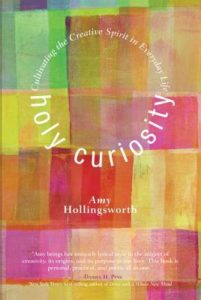 Holy Curiosity: Cultivating the Creative Spirit in Everyday Life Amy Hollingsworth (Cascade) $18.00 Perhaps you know Hollingsworth for her excellent book The Simple Faith of Mister Rogers or the riveting memoir she co-wrote with her son, Runaway Radical. She’s a fine writer and her craft is on full display here as she weaves her own story about discovering something essential about the creative process. As one writer said in a back cover review “Amy draws thread from spools ancient and modern, mythic and scientific, experiential and theoretical and weaves a seamless story…”
Holy Curiosity: Cultivating the Creative Spirit in Everyday Life Amy Hollingsworth (Cascade) $18.00 Perhaps you know Hollingsworth for her excellent book The Simple Faith of Mister Rogers or the riveting memoir she co-wrote with her son, Runaway Radical. She’s a fine writer and her craft is on full display here as she weaves her own story about discovering something essential about the creative process. As one writer said in a back cover review “Amy draws thread from spools ancient and modern, mythic and scientific, experiential and theoretical and weaves a seamless story…”
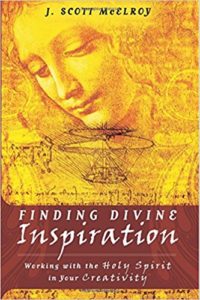 Finding Divine Inspiration: Working with the Holy Spirit in Your Creativity Scott McElroy (Destiny Image) $15.99 Scott has made a unique contribution in this field of “creativity studies” by asking, very responsibly, I might add, what active role the Holy Spirit has in our creative efforts. I like Scott a lot and many will appreciate this simple guide to discerning God’s guidance in our own efforts at the creative process. By the way, McElroy has since gone on to write a very useful book for those involved in arts ministries in the local church called Creative Church Handbook: Releasing the Power of the Arts in Your Congregation (IVP; $20.00.)
Finding Divine Inspiration: Working with the Holy Spirit in Your Creativity Scott McElroy (Destiny Image) $15.99 Scott has made a unique contribution in this field of “creativity studies” by asking, very responsibly, I might add, what active role the Holy Spirit has in our creative efforts. I like Scott a lot and many will appreciate this simple guide to discerning God’s guidance in our own efforts at the creative process. By the way, McElroy has since gone on to write a very useful book for those involved in arts ministries in the local church called Creative Church Handbook: Releasing the Power of the Arts in Your Congregation (IVP; $20.00.)
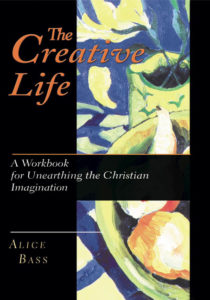 The Creative Life: A Workbook for Unearthing the Christian Imagination Alice Bass (InterVarsity Press) $19.00 You know we are fond of IVP and respect and trust their instincts about books. This was a workbook full of thoughtful exercises and things to generate greater creativity for anyone hope to unearth their own gift and capacities. I suspect this could be described as an evangelical version of something like The Artist’s Way.
The Creative Life: A Workbook for Unearthing the Christian Imagination Alice Bass (InterVarsity Press) $19.00 You know we are fond of IVP and respect and trust their instincts about books. This was a workbook full of thoughtful exercises and things to generate greater creativity for anyone hope to unearth their own gift and capacities. I suspect this could be described as an evangelical version of something like The Artist’s Way.
Bass has worked in theatre and here is what Karen, Lund, another actor has written about The Creative Life workbook:
“The Creative Life is a straightforward, practical approach to reclaiming your creativity for the Creator. Obviously inspired and delightfully inspirational, Alice Bass speaks eloquently to the artist in each of us that has been silenced by fear but seeks to re-emerge in truth and light. This workbook is a must for the Christian artist who seeks to reconnect or connect for the first time his gifts with the Giver.”
 The Creative Call: An Artist’s Response to the Way of the Spirit Janice Elsheimer (Shaw/Waterbrook) $16.99 This is a book loaded with ideas, experiments, exercises and more. Designed for anyone wanting to enhance creativity, even if it is backyard gardening, a hobby of photography or digging out an old instrument from your youth. It does seems perhaps very suited for writers; for a while, this publisher (founded by Harold and Luci Shaw) had a few books in a series they called “The Writer’s Palette.) Nice, huh?
The Creative Call: An Artist’s Response to the Way of the Spirit Janice Elsheimer (Shaw/Waterbrook) $16.99 This is a book loaded with ideas, experiments, exercises and more. Designed for anyone wanting to enhance creativity, even if it is backyard gardening, a hobby of photography or digging out an old instrument from your youth. It does seems perhaps very suited for writers; for a while, this publisher (founded by Harold and Luci Shaw) had a few books in a series they called “The Writer’s Palette.) Nice, huh?
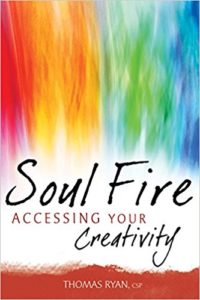
Soul Fire: Accessing Your Creativity Thomas Ryan, CSP (Skylight Paths) $16.99 This is deeply spiritual in an ecumenical, even interfaith way; the author is a Catholic mystic and yoga instructor and draws here on some of the usual suspects on tapping your inner spirit and creative impulses – Julia Cameron, Dan Wakefield, Marianne Williamson, Jung, even. He has some lovely, evocative poetry, lots of creativity exercises, sidebars with practical advise. This was released before the popularity of Richard Rohr’s Falling Upward but Ryan does deal (as does Rohr) with some “second half of life” stuff and those that appreciate Rohr will like this.
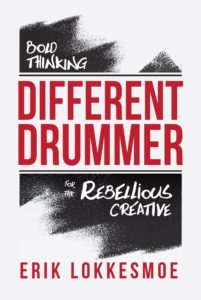 Different Drummer: Bold Thinking for the Rebellious Creative Erik Lokkesmoe (Elevant) $13.99 This small book is expertly designed with short and pithy chapters, super-graphics, cool design with touches of red ink and black graphics, with no-holds-barred bold reminders to be a “difference maker.” Lokkesmoe – who left a job in the policy world of Washington DC to be a culturally creative organizer — shows how to be encouraged, how to let go of fear and move forward into your essential role in God’s missional plan. This is very, very practical but yet expressing a youthful sort of idealistic energy. First it’ll rock your world and then you’ll really dig it.
Different Drummer: Bold Thinking for the Rebellious Creative Erik Lokkesmoe (Elevant) $13.99 This small book is expertly designed with short and pithy chapters, super-graphics, cool design with touches of red ink and black graphics, with no-holds-barred bold reminders to be a “difference maker.” Lokkesmoe – who left a job in the policy world of Washington DC to be a culturally creative organizer — shows how to be encouraged, how to let go of fear and move forward into your essential role in God’s missional plan. This is very, very practical but yet expressing a youthful sort of idealistic energy. First it’ll rock your world and then you’ll really dig it.
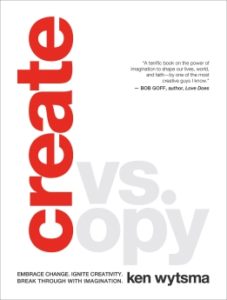 Create vs Copy: Embrace Change, Ignite Creativity, Break Through with Imagination Ken Wytsma (Moody Press) $14.99 I hope you recall that we’ve touted Wytsma before – we highly recommend his book that came out of his spectacular work founding the annual “Justice Conference” called Pursuing Justice as well as his excellent book on racism and white privilege, The Myth of Equality. But this hand-sized hardback is not only pretty cool to see but is laden with great insight about how to cultivate a creative mindset in life and leadership, using greater imagination, learning how to unleash some of our in-born creativity. The blurb on the front by Bob Goff is pretty nifty, too.
Create vs Copy: Embrace Change, Ignite Creativity, Break Through with Imagination Ken Wytsma (Moody Press) $14.99 I hope you recall that we’ve touted Wytsma before – we highly recommend his book that came out of his spectacular work founding the annual “Justice Conference” called Pursuing Justice as well as his excellent book on racism and white privilege, The Myth of Equality. But this hand-sized hardback is not only pretty cool to see but is laden with great insight about how to cultivate a creative mindset in life and leadership, using greater imagination, learning how to unleash some of our in-born creativity. The blurb on the front by Bob Goff is pretty nifty, too.
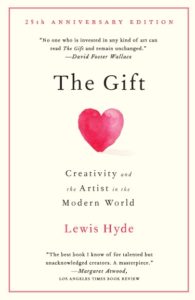 The Gift: Creativity and the Artist in the Modern World Lewis Hyde (Vintage) $16.95 This is less a workshop on being creative or an inspirational guide to finding your flow but a very impressive, almost scholarly history of how creators make a difference. Margaret Atwood says it is “the best book I know of for talented but unacknowledged creators. A masterpiece.” Jonathan Lethem said it is an “epiphany, in sculpted prose.” It is a manifesto of sorts, a call for a culture not to be so governed by money and commodity but to be reformed by the audacious generosity of artists who share their work as gift. Canadian folk-rocker Bruce Cockburn did a neat song on his 1988 Big Circumstance album inspired by this book called “The Gift.” Enjoy that here.
The Gift: Creativity and the Artist in the Modern World Lewis Hyde (Vintage) $16.95 This is less a workshop on being creative or an inspirational guide to finding your flow but a very impressive, almost scholarly history of how creators make a difference. Margaret Atwood says it is “the best book I know of for talented but unacknowledged creators. A masterpiece.” Jonathan Lethem said it is an “epiphany, in sculpted prose.” It is a manifesto of sorts, a call for a culture not to be so governed by money and commodity but to be reformed by the audacious generosity of artists who share their work as gift. Canadian folk-rocker Bruce Cockburn did a neat song on his 1988 Big Circumstance album inspired by this book called “The Gift.” Enjoy that here.
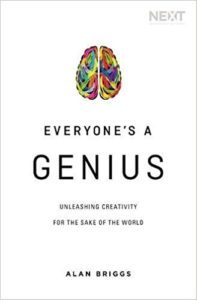 Everyone’s a Genius: Unleashing Creativity for the Sake of the World Alan Briggs (Thomas Nelson) $16.99 Briggs has a great book about staying put and caring about your own neighborhood called Staying is the New Going and the introduction (by Michael Frost) about how literature can evoke a sense of place is worth the price of the book. Many have heard me rave about this author. This is a fairly new one, absolutely fascinating, about team-building and brain studies and leadership and art and culture and, well making stuff. Very nice; a fabulous way to think about creativity and, curiously, missional church leadership, too. Give it a try – you’ll be captivated.
Everyone’s a Genius: Unleashing Creativity for the Sake of the World Alan Briggs (Thomas Nelson) $16.99 Briggs has a great book about staying put and caring about your own neighborhood called Staying is the New Going and the introduction (by Michael Frost) about how literature can evoke a sense of place is worth the price of the book. Many have heard me rave about this author. This is a fairly new one, absolutely fascinating, about team-building and brain studies and leadership and art and culture and, well making stuff. Very nice; a fabulous way to think about creativity and, curiously, missional church leadership, too. Give it a try – you’ll be captivated.
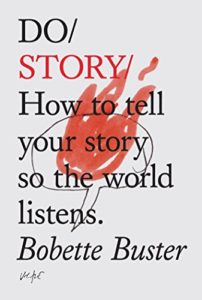 Do Story: How to Tell Your Story So the World Listens Bobette Buster (Chronicle Books) $16.95 Buster is an extraordinary woman who teaches storytelling at Northeastern University and has done presentations with all the great film studios (Pixar, Sony, Disney.) While this book seems to be more about engaging an audience with live storytelling – if you want to do a TED talk, you’ve got to get this – it is rich for anyone doing any sort of storytelling, writing, marketing, even. It’s a very hip little volume by an amazingly important person of faith. Enjoy.
Do Story: How to Tell Your Story So the World Listens Bobette Buster (Chronicle Books) $16.95 Buster is an extraordinary woman who teaches storytelling at Northeastern University and has done presentations with all the great film studios (Pixar, Sony, Disney.) While this book seems to be more about engaging an audience with live storytelling – if you want to do a TED talk, you’ve got to get this – it is rich for anyone doing any sort of storytelling, writing, marketing, even. It’s a very hip little volume by an amazingly important person of faith. Enjoy.
+++
Well. I had seven big points that I preached about in the Christian Fiction Writers workshop, seven things books can do as we read them and how authors should be thinking about how the results or fruit of their writerly art. Of course they are not to pander or write directly in order to achieve these goals (that’s not the point) but it might be that knowing how character or plot development matters to readers, and some of what good art can evoke, will at least keep them moving in the right direct as they dream up worlds, create characters, allow the plots to meander and grow.
Those seven points could all be sermons in themselves, but at the very least I hope the participants recall that I insisted that readers respond to novels – and films and plays and TV shows and ballads – because they help us narrate our own lives; we connect the dots of the narrative and make sense of our own storied lives. We are wired for words because we are made in the image of a speaking God – let there be! – and our human love-language is story because we are made in the image of a storytelling God. (The Bible is a big, complicated, story, after all, surely an unfolding drama.
The narrative nature of Scripture is, happily, getting a lot of attention these days. There are wonderful resources that help us explore this such as The Drama of Scripture: Finding Our Place in the Biblical Story by Craig Bartholomew and Michael Goheen (Baker 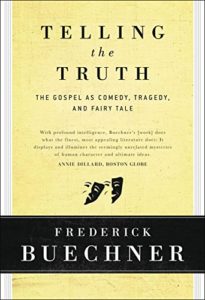 Academic; $24.99) which is very good, even for seasoned Bible readers. Since I was talking to writers,
Academic; $24.99) which is very good, even for seasoned Bible readers. Since I was talking to writers,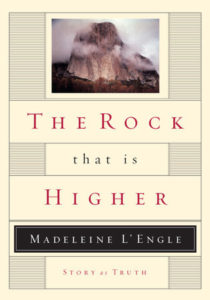 though, I slipped into an advertisement for Frederick Buechner’s fascinating Telling the Truth: The Gospel as Tragedy, Comedy and Fairy Tale (HarperOne; $17.99.) There is much more that should be said about God as Word and the Bible as Story. It’s important for all of us but should be great encouragement to those honing their writing chops, inventing fantastical worlds, spinning years and writing mysteries. Stories are close to the heart of God. And they work for us, helping us long for the right stuff, to learn to belong, to realize the story we are a part of, as Madeline L’Engle explores in her lovely The Rock That Is Higher: Story as Truth (Waterbrook; $16.99.)
though, I slipped into an advertisement for Frederick Buechner’s fascinating Telling the Truth: The Gospel as Tragedy, Comedy and Fairy Tale (HarperOne; $17.99.) There is much more that should be said about God as Word and the Bible as Story. It’s important for all of us but should be great encouragement to those honing their writing chops, inventing fantastical worlds, spinning years and writing mysteries. Stories are close to the heart of God. And they work for us, helping us long for the right stuff, to learn to belong, to realize the story we are a part of, as Madeline L’Engle explores in her lovely The Rock That Is Higher: Story as Truth (Waterbrook; $16.99.)
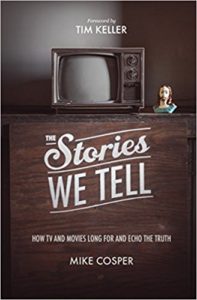 Time didn’t allow, but in a more extensive workshop teaching about this, I’d look at least at the splendid table of contents of The Stories We Tell: How TV and Movies Long for and Echo the Truth by Mike Cosper (Crossway; $15.99) which gives us new ways to appreciate the stories we watch (or read!) Although written for viewers themselves, I think writers would be helped by The Stories We Tell, just being reminded how all this works.
Time didn’t allow, but in a more extensive workshop teaching about this, I’d look at least at the splendid table of contents of The Stories We Tell: How TV and Movies Long for and Echo the Truth by Mike Cosper (Crossway; $15.99) which gives us new ways to appreciate the stories we watch (or read!) Although written for viewers themselves, I think writers would be helped by The Stories We Tell, just being reminded how all this works.
In the middle of my talk I did a hefty, if quick, riff on James K.A. Smith’s You Are What You Love: The Spiritual Power of Habit (Brazos; $19.99.) It was during one of the points about how reading well can shape our desires (and, consequentially, our virtue, as 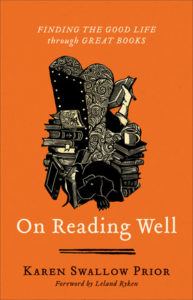 so beautifully explored in the forthcoming On Reading Well: Finding the Good Life Through Great Books by Karen Swallow Prior (Brazos Press; $19.99.) I love Smith’s line about how our imaginations can be “conscripted into a story” of a certain vision of the good life. That’s what good stories do; they grab our hearts, shape our imagination, and thereby form our desires (for better or for worse, of course. They sneak right past those “watchful dragons” you know.) They help us want what we want and love what we love. For those who take Christian beliefs seriously, and want to be part of God’s redemptive story, the problem is, as Smith warns, we might not love what we think we do.
so beautifully explored in the forthcoming On Reading Well: Finding the Good Life Through Great Books by Karen Swallow Prior (Brazos Press; $19.99.) I love Smith’s line about how our imaginations can be “conscripted into a story” of a certain vision of the good life. That’s what good stories do; they grab our hearts, shape our imagination, and thereby form our desires (for better or for worse, of course. They sneak right past those “watchful dragons” you know.) They help us want what we want and love what we love. For those who take Christian beliefs seriously, and want to be part of God’s redemptive story, the problem is, as Smith warns, we might not love what we think we do.
So, again — stories can shape our loves and desires and the social imaginaries which give rise to certain ways of life. That is, we become virtuous (or not) somewhat because of the stories we enter.
[To be clear, as Smith explains in You Are What You Love, this includes all sorts of influences by pop culture and our living in the world as we do; practices like how we shop and use cell phones, how we stand with our hands over our hearts singing an anthem to our nation, what we do, over and over, which he calls “secular liturgies.” But his point is utterly germane when we think about how novels shape us; Karen Swallow Prior knows this and nicely cites Smith early on in her forthcoming On Reading Well. Mark you calendars now if you are anywhere near us September 14th. If you care about story, if you love or want to love books, if you want a thoughtful conversation about virtue and narrative and loving the right stuff about the right books, you’ve got to join us!]
So, again, books matter, reading influences us, and consequently there is much at stake in the holy call to write well and artfully tell good stories of depth and truth.
Just for fun, here is a famous quote, again from C.S. Lewis, that I sometimes ponder when thinking about literature, about fiction reminding us how living in the “real” world is enhanced by stories, even fantasy and fairy stories. I hope my writer friends appreciate it (especially those that are writing fantasy or speculative fiction or some kind of magical realism:
Fairy land arouses a longing for [a child] knows not what. It stirs and troubles him (to his life-long enrichment) with the dim sense of something beyond his reach and, far from dulling or emptying the actual world, gives it a new dimension of depth. He does not despise real woods because he has read of enchanted woods: The reading makes all real woods a little enchanted.
A FEW GOOD BOOKS ABOUT THE READING LIFE
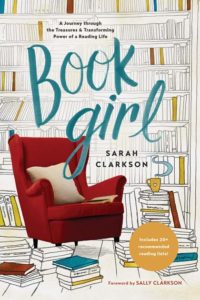 Book Girl: A Journey Through the Treasures & Transforming Power of a Reading Life Sarah Clarkson (Tyndale) $15.99 Oh how I wish I had known about this when we did our BookNotes a week or so ago about books you should pre-order. Book Girl by Sarah Clarkson comes out in September and you certainly should pre-order it right away. As I hope you saw, I highly recommended in that BookNotes On Reading Well by Karen Swallow Prior (who will be doing a presentation at our store on September 14th 2018) and invited you to pre-order that book about reading. But this beautiful book by Sally Clarkson should also have been on that list as well. It comes out in September and the first few chapters are about as sweet as anything I’ve ever read about the power of books, the virtues of the reading life, and joy of discovering books. How interesting that there are two books about the reading life coming out from two Christian publishers this fall.
Book Girl: A Journey Through the Treasures & Transforming Power of a Reading Life Sarah Clarkson (Tyndale) $15.99 Oh how I wish I had known about this when we did our BookNotes a week or so ago about books you should pre-order. Book Girl by Sarah Clarkson comes out in September and you certainly should pre-order it right away. As I hope you saw, I highly recommended in that BookNotes On Reading Well by Karen Swallow Prior (who will be doing a presentation at our store on September 14th 2018) and invited you to pre-order that book about reading. But this beautiful book by Sally Clarkson should also have been on that list as well. It comes out in September and the first few chapters are about as sweet as anything I’ve ever read about the power of books, the virtues of the reading life, and joy of discovering books. How interesting that there are two books about the reading life coming out from two Christian publishers this fall.
Book Girls: A Journey… is written specifically for women (it is called Book Girl, after all) but I was wiping tears from my eyes as I read these splendid, glorious words from a kindred sister. What a book! Much of the passion I shared for the role of a riveting story or the deep meaning of good fiction with the California ACFW gang is also found in Clarkson’s lovely, seasoned voice, and if you like being encouraged to read, or enjoy ruminations on why your book hobby is so very vital, well, this really is wonderful. You will love it.
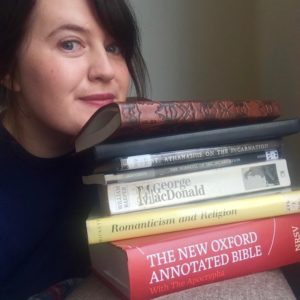 The big second half of Book Girl is comprised of Sarah Clarkson’s remarkably interesting lists of books around varying themes and genres (fiction and non-fiction.) As I skimmed these chapters on real-life topics and marveled at the many books she deftly annotated I kept shaking my head in agreement and kept smiling in recognition…
The big second half of Book Girl is comprised of Sarah Clarkson’s remarkably interesting lists of books around varying themes and genres (fiction and non-fiction.) As I skimmed these chapters on real-life topics and marveled at the many books she deftly annotated I kept shaking my head in agreement and kept smiling in recognition…
Man, we stock a lot of these titles and so wish we had Sarah for a customer! Ha! Seriously, some bookstores might find a good book loving loyal customer or two the very thing that keeps them afloat in these hard days of declining interest in books and bookstores. I couldn’t help but thinking that maybe those who take her up on these high quality books will rediscover a favorite bookseller (and not buy them from the faceless porno-dealer Amazon.)
Books about books are always interesting to me, and we have bunches of them here at the shop, but this one is ideal for any Christian reader. Whether you’re a book girl or not. Again, you can pre-order this beautiful paperback even now at the 20% discount price.
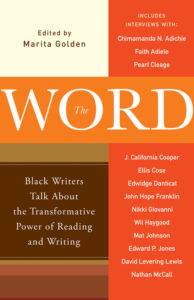 The Word: Black Writers Talk about the Transformative Power of Reading and Writing edited by Marita Golden (Broadway) $14.99 I nearly have the first pages of this remarkable book memorized as I’ve read them out loud to so many groups… these opening vignettes of novelist and memoirist Marita Golden’s encounter with books have very significantly moved me and never fails to remind me of the impact of books and why we do what we do as booksellers. I love these kinds of anthologies about folks talking about the power of books, reading them and even writing them. That it is black writers makes it that much more vital.
The Word: Black Writers Talk about the Transformative Power of Reading and Writing edited by Marita Golden (Broadway) $14.99 I nearly have the first pages of this remarkable book memorized as I’ve read them out loud to so many groups… these opening vignettes of novelist and memoirist Marita Golden’s encounter with books have very significantly moved me and never fails to remind me of the impact of books and why we do what we do as booksellers. I love these kinds of anthologies about folks talking about the power of books, reading them and even writing them. That it is black writers makes it that much more vital.
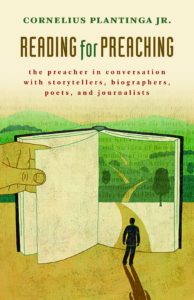 Reading for Preaching: The Preacher in Conversation with Storytellers, Biographers, Poets, and Journalists Cornelius Plantinga, Jr. (Eerdmans) $14.00 Those who are fairly new to BookNotes might want to click back to this short review I did of this when it first came out. Plantinga is famous for having written a number of great books (including one of my all times favorites, Engaging God’s World: A Christian Vision of Faith, Learning and Living) but one of the most interesting (and generative) things he has done is to offer a retreat for pastors where they talk about novels (and other good writing) they have been assigned.This spectacular resource came out of those retreats; it was designed to enhance preaching, but I think it is fabulous for anyone that likes good books and wonders just a bit more of what we can learn from them. As Richard Lischer says, Reading for Preaching represents the gift of a lifetime. And, again, no matter if you are a preacher or not, as Thomas Long writes, “This book is about delightful reading, and it is itself a delight to read.”
Reading for Preaching: The Preacher in Conversation with Storytellers, Biographers, Poets, and Journalists Cornelius Plantinga, Jr. (Eerdmans) $14.00 Those who are fairly new to BookNotes might want to click back to this short review I did of this when it first came out. Plantinga is famous for having written a number of great books (including one of my all times favorites, Engaging God’s World: A Christian Vision of Faith, Learning and Living) but one of the most interesting (and generative) things he has done is to offer a retreat for pastors where they talk about novels (and other good writing) they have been assigned.This spectacular resource came out of those retreats; it was designed to enhance preaching, but I think it is fabulous for anyone that likes good books and wonders just a bit more of what we can learn from them. As Richard Lischer says, Reading for Preaching represents the gift of a lifetime. And, again, no matter if you are a preacher or not, as Thomas Long writes, “This book is about delightful reading, and it is itself a delight to read.”
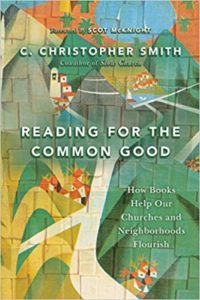 Reading for the Common Good: How Books Help Our Churches and Neighborhoods Flourish C. Christopher Smith (IVP) $16.00 I said in my little writer’s workshop that this was a book I wished I had written and that I so, so value it. I cannot but want to press a copy into the hands of anyone who cares about books, about thinking well and studying and talking about books and being committed to the reading life; Chris really understands the holy significance of books in Kingdom ministry and knows that slow reading and careful conversations are key practices to reform our social imaginaries. This book has such a unique and valuable take on things that I need to say that I even think that without a wider embrace of the ideas shared in this provocative, thoughtful book, the role of Christian bookstores may be doomed. Reading matters, and this gives as robust (and enjoyable) vision for that as any book I know. Buy a few, please, and share them. Give one to a book-lovin’ friend and one who ought to be. Yes!
Reading for the Common Good: How Books Help Our Churches and Neighborhoods Flourish C. Christopher Smith (IVP) $16.00 I said in my little writer’s workshop that this was a book I wished I had written and that I so, so value it. I cannot but want to press a copy into the hands of anyone who cares about books, about thinking well and studying and talking about books and being committed to the reading life; Chris really understands the holy significance of books in Kingdom ministry and knows that slow reading and careful conversations are key practices to reform our social imaginaries. This book has such a unique and valuable take on things that I need to say that I even think that without a wider embrace of the ideas shared in this provocative, thoughtful book, the role of Christian bookstores may be doomed. Reading matters, and this gives as robust (and enjoyable) vision for that as any book I know. Buy a few, please, and share them. Give one to a book-lovin’ friend and one who ought to be. Yes!
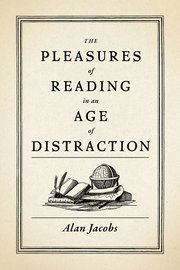 The Pleasures of Reading in an Age of Distraction Alan Jacobs (Oxford University Press) $19.95 Jacobs is an exquisite, world-class scholar, a serious essayist – think First Things or Image or the old Books & Culture – and this wonderful 2011 book was a contribution to the discussions around the topic of how on-line reading effects our capacity to pay attention, to read well, to retain what we’ve read. Important books like Nicholas Carr’s The Shallows (a very good, if alarming, read) were pessimistic, exposing how too much time on Facebook and social media erodes our capacities to read seriously. The Shallows was understandably dire, an Amusing Ourselves to Death for the digital age. Well, in all of these conversations and broadsides against tech and laments about the erosion of our reading habits, few noted that what was at stake was not just retaining great learning, but, well, enjoyment. We are supposed to be having fun, reading books we like. So this wonderful book – still a rather serious work of lit-and-culture-criticism from Oxford University Press – is about pleasure. Many of our best customers have truly enjoyed it.
The Pleasures of Reading in an Age of Distraction Alan Jacobs (Oxford University Press) $19.95 Jacobs is an exquisite, world-class scholar, a serious essayist – think First Things or Image or the old Books & Culture – and this wonderful 2011 book was a contribution to the discussions around the topic of how on-line reading effects our capacity to pay attention, to read well, to retain what we’ve read. Important books like Nicholas Carr’s The Shallows (a very good, if alarming, read) were pessimistic, exposing how too much time on Facebook and social media erodes our capacities to read seriously. The Shallows was understandably dire, an Amusing Ourselves to Death for the digital age. Well, in all of these conversations and broadsides against tech and laments about the erosion of our reading habits, few noted that what was at stake was not just retaining great learning, but, well, enjoyment. We are supposed to be having fun, reading books we like. So this wonderful book – still a rather serious work of lit-and-culture-criticism from Oxford University Press – is about pleasure. Many of our best customers have truly enjoyed it.
I wish I had mentioned the Jacobs’ Pleasures of Reading to my new writer friends in San Francisco. Although I emphasized all kinds of deep meaning and self-awareness and worldview formation and the like that reading fiction can evoke in us, let’s face it: authors want people to say they enjoyed their book! They want readers to take pleasure in the story. Yes, yes, yes.
+++
Since I was talking to writers, inspiring them to think about their calling and task, to — highfalutin’ as it may sound – develop a Christian perspective on a philosophy of the arts and a theologically-sound perspective on the creative process and a faith-informed view of the craft of writing – I figured these two books simply had to be mentioned and heartily recommended. In a longer workshop I’d cite them carefully and read lovely, thoughtful excerpts. I bet you recall me mentioning them before.
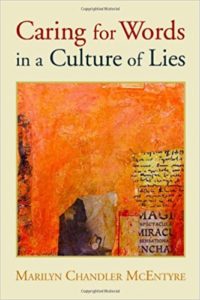 Caring for Words in a Culture of Lies Marilyn McEntyre (Eerdmans) $19.00 What if words were like natural resources, gift from God who wants to steward them well? These are brilliant “stewardship strategies” for anyone who uses words in these awful times. Highly recommended, especially for writers. Why don’t you just get it now, if you haven’t yet, because I’m going to keep recommending it over and over. It’s that good and that important.
Caring for Words in a Culture of Lies Marilyn McEntyre (Eerdmans) $19.00 What if words were like natural resources, gift from God who wants to steward them well? These are brilliant “stewardship strategies” for anyone who uses words in these awful times. Highly recommended, especially for writers. Why don’t you just get it now, if you haven’t yet, because I’m going to keep recommending it over and over. It’s that good and that important.
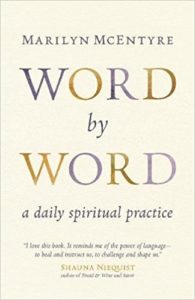 Word By Word: A Daily Spiritual Practice Marilyn McEntyre (Eerdmans) $17.99 This is like an ordinary Christian daily devotional, but instead of the standard Bible verse and reflection on it, this offers a word on ponder. One reflects on it in a variety of ways, a different angle each day, for a week. It is a beautifully (and deeply spiritual) tutorial on plumbing the meaning of the words and phrases we use, entering into them in wise and fruitful ways.
Word By Word: A Daily Spiritual Practice Marilyn McEntyre (Eerdmans) $17.99 This is like an ordinary Christian daily devotional, but instead of the standard Bible verse and reflection on it, this offers a word on ponder. One reflects on it in a variety of ways, a different angle each day, for a week. It is a beautifully (and deeply spiritual) tutorial on plumbing the meaning of the words and phrases we use, entering into them in wise and fruitful ways.
I can’t say enough about those two books. Writer or not, reader or not, these are so very important to our flourishing and health in this crazy world.
To reinforce some of this deep conviction of ours, at the very end of the Association of Christian Fiction Writer’s talk I cited what is shown in large, Celtic-type script on the back cover of the new fantasy novel (the first of a series, of course) by 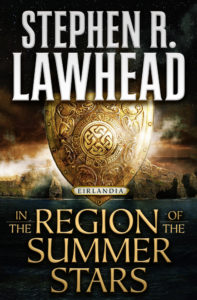 Stephen Lawhead:
Stephen Lawhead:
“Thus does the world change, not with a sword. But with a word.”
That’s from the brand new In the Region of the Summer Stars, Book One in the Eirlandia series (Tor; $25.99.) I hope you know Steve Lawhead who has done a prodigious body of work of fantasy and (ancient) historical fiction.
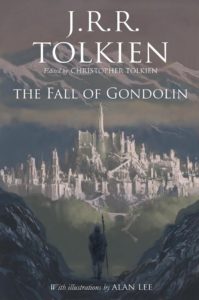 And, if you will allow me this stream-of-consciousness mention, speaking of fantasy: it is great news for Tolkien lovers that Christopher Tolkien has been working on yet another (and most likely the last) unpublished story of Middle-earth fiction from his famous father. Look for The Fall of Gondolin by J.R.R. Tolkien coming from Houghton Mifflin ($30.00) on the street date of August 30, 2918. Naturally, you can pre-order it by following the link to our secure order form page, below.
And, if you will allow me this stream-of-consciousness mention, speaking of fantasy: it is great news for Tolkien lovers that Christopher Tolkien has been working on yet another (and most likely the last) unpublished story of Middle-earth fiction from his famous father. Look for The Fall of Gondolin by J.R.R. Tolkien coming from Houghton Mifflin ($30.00) on the street date of August 30, 2918. Naturally, you can pre-order it by following the link to our secure order form page, below.
A FEW ABOUT WRITING
 On Writing: A Memoir of the Craft Stephen King (Scribner) $17.00 I don’t know anyone who has read this book who hasn’t exclaimed about how surprised they were by it, and how enjoyable and inspiring it was; even, for some, how very helpful it was. It is by almost all accounts a tremendous read, wise and thoughtful and full of basic, solid advice, even if it is mostly written as a memoir. A hint: he’s interested in the mechanics of language usage more than you may wish but not big on plot outlines.
On Writing: A Memoir of the Craft Stephen King (Scribner) $17.00 I don’t know anyone who has read this book who hasn’t exclaimed about how surprised they were by it, and how enjoyable and inspiring it was; even, for some, how very helpful it was. It is by almost all accounts a tremendous read, wise and thoughtful and full of basic, solid advice, even if it is mostly written as a memoir. A hint: he’s interested in the mechanics of language usage more than you may wish but not big on plot outlines.
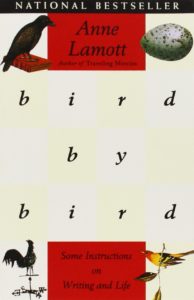 Bird by Bird: Some Instructions on Writing and Life Anne Lamott (Anchor) $16.00 Are there any serious writers who don’t know this book? It was called “a warm, generous and hilarious guide through the writer’s world and its treacherous swamps.” It is pretty clear that she came to Christian faith as she was writing this – Traveling Mercies colorfully tells that story, of course. An enduring book, it came out in 1994 (preceding the novel, a few years later, Crooked Little Hearts.) As the Seattle Times wrote of it, Bird by Bird is “A gift to all of us mortals who write or ever wanted to write… sidesplittingly funny, patiently wise and alternately cranky and kind – a reveille to get off our duffs and start writing now, while we still can.” Yup.
Bird by Bird: Some Instructions on Writing and Life Anne Lamott (Anchor) $16.00 Are there any serious writers who don’t know this book? It was called “a warm, generous and hilarious guide through the writer’s world and its treacherous swamps.” It is pretty clear that she came to Christian faith as she was writing this – Traveling Mercies colorfully tells that story, of course. An enduring book, it came out in 1994 (preceding the novel, a few years later, Crooked Little Hearts.) As the Seattle Times wrote of it, Bird by Bird is “A gift to all of us mortals who write or ever wanted to write… sidesplittingly funny, patiently wise and alternately cranky and kind – a reveille to get off our duffs and start writing now, while we still can.” Yup.
 Letters & Life: On Being a Writer, On Being a Christian Bret Lott (Crossway) $22.99 Kudos to Crossway, so many years ago influenced by Francis Schaeffer, for their conviction that, even for their very conservative theological views, they know that good art matters. They published novelist Larry Woiwode when the New Yorker crowd dropped him; they publish Lott, a New York Times bestselling author (whose book Jewel was even an Oprah Book Club selection) who has served on the National Council on the Arts. Yes, Lott is a straight-laced Baptist Sunday school teacher and he talks a lot in this collection of essays about his classic, evangelical faith, but he also offers deep and erudite ruminations on the craft of writing, on what we mean by “literary fiction” (he doesn’t know either, btw) and all manner of important stuff for serious literary types. Highly recommended.
Letters & Life: On Being a Writer, On Being a Christian Bret Lott (Crossway) $22.99 Kudos to Crossway, so many years ago influenced by Francis Schaeffer, for their conviction that, even for their very conservative theological views, they know that good art matters. They published novelist Larry Woiwode when the New Yorker crowd dropped him; they publish Lott, a New York Times bestselling author (whose book Jewel was even an Oprah Book Club selection) who has served on the National Council on the Arts. Yes, Lott is a straight-laced Baptist Sunday school teacher and he talks a lot in this collection of essays about his classic, evangelical faith, but he also offers deep and erudite ruminations on the craft of writing, on what we mean by “literary fiction” (he doesn’t know either, btw) and all manner of important stuff for serious literary types. Highly recommended.
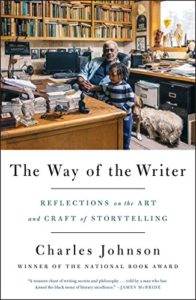 The Way of the Writer: Reflections on the Art and Craft of Storytelling Charles Johnson (Scribner) $16.00 I have a few friends who swear by this meaty book by an fiction writer who has won the prestigious National Book Award. And who has a degree in philosophy and has been a MacArthur Fellow. In 2002 Johnson received the Arts and Letters Award in Literature from the American Academy of Arts and Letters. James McBride – please tell me you know McBride — says about The Way of the Writer “A treasure chest of writing secrets and philosophy… told by a man who has kissed the black stone of literary excellence.”
The Way of the Writer: Reflections on the Art and Craft of Storytelling Charles Johnson (Scribner) $16.00 I have a few friends who swear by this meaty book by an fiction writer who has won the prestigious National Book Award. And who has a degree in philosophy and has been a MacArthur Fellow. In 2002 Johnson received the Arts and Letters Award in Literature from the American Academy of Arts and Letters. James McBride – please tell me you know McBride — says about The Way of the Writer “A treasure chest of writing secrets and philosophy… told by a man who has kissed the black stone of literary excellence.”
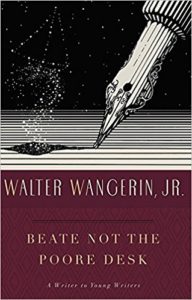 Beate Not the Poore Desk: A Writer to Young Writers Walter Wangerin, Jr. (The Rabbit Room) $14.95 Walt Wangerin is one of the great writers of our time, a Lutheran pastor, fantasy writer, children’s author, memoirist, devotional writer, Bible scholar, poet, and novelist. My, my, my. You should read anything he writes. Kudos to The Rabbit Room for offering this book where this National Book Award-winner “turns his keen eye upon the craft of writing.”
Beate Not the Poore Desk: A Writer to Young Writers Walter Wangerin, Jr. (The Rabbit Room) $14.95 Walt Wangerin is one of the great writers of our time, a Lutheran pastor, fantasy writer, children’s author, memoirist, devotional writer, Bible scholar, poet, and novelist. My, my, my. You should read anything he writes. Kudos to The Rabbit Room for offering this book where this National Book Award-winner “turns his keen eye upon the craft of writing.”
Rev. Wangerin shares some of his own foibles and missteps as a writer and a lot of his own story, actually. But much of this is very, very practical. I promise that if you are a young writer you will really value this short book. A nicely designed paperback, too, with French Flaps that fold over; well done!
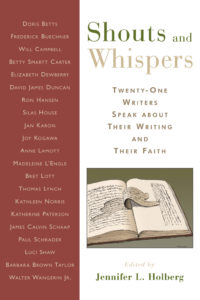 Shouts and Whispers: Twenty-One Writers Speak About Their Writing and Their Faith edited by Jennifer L. Holberg (Eerdmans) $18.99 This is the second marvelous book that more or less came out of the legendary, bi-annual Calvin Festival of Faith and Writing. Here you get remarkable, sometimes stunning, essays by excellent wordsmiths and storytellers such as Doris Betts, Frederick Buechner, Betty Smartt Carter, David James Duncan, Jan Karon, Joy Kogawa, Anne Lamott, Madeleine L’Engle, Brett Lott, Thomas Lynch, Katherine Paterson, Barbara Brown Taylor and more. Wow. Just wow. You need this.
Shouts and Whispers: Twenty-One Writers Speak About Their Writing and Their Faith edited by Jennifer L. Holberg (Eerdmans) $18.99 This is the second marvelous book that more or less came out of the legendary, bi-annual Calvin Festival of Faith and Writing. Here you get remarkable, sometimes stunning, essays by excellent wordsmiths and storytellers such as Doris Betts, Frederick Buechner, Betty Smartt Carter, David James Duncan, Jan Karon, Joy Kogawa, Anne Lamott, Madeleine L’Engle, Brett Lott, Thomas Lynch, Katherine Paterson, Barbara Brown Taylor and more. Wow. Just wow. You need this.
 Writers to Read: Nine Names That Belong On Your Bookshelf Douglas Wilson (Crossway) $16.99 Wilson is a bit curmudgeonly and an incredible wordsmith (he himself wrote Wordsmithy: Hot Tips for the Writing Life.) This asks, in a way, why certain writers are legendary, classic, enduring. And what it means to choose wise ones to emulate. Of course it is a truism, a classic adage, that to be a better writer one must read good writers. Did I say that in the ACFW Zoom presentation? I intended to, but it almost sounds too self-serving, bookseller that I am. But I’ll say it here, now. To be a good thinker, a good writer, a good reader – read!
Writers to Read: Nine Names That Belong On Your Bookshelf Douglas Wilson (Crossway) $16.99 Wilson is a bit curmudgeonly and an incredible wordsmith (he himself wrote Wordsmithy: Hot Tips for the Writing Life.) This asks, in a way, why certain writers are legendary, classic, enduring. And what it means to choose wise ones to emulate. Of course it is a truism, a classic adage, that to be a better writer one must read good writers. Did I say that in the ACFW Zoom presentation? I intended to, but it almost sounds too self-serving, bookseller that I am. But I’ll say it here, now. To be a good thinker, a good writer, a good reader – read!
Here in the fascinating and entertaining Writers to Read: Nine Names… the opinionated Wilson tells you why he commends Chesterton, Menchken, Wodehouse, Eliot, Tolkien, Lewis, Capon, Marilyn Robinson, and his son N.D. Wilson.
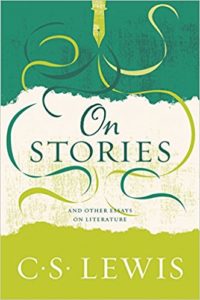 On Stories And Other Essays on Literature C.S. Lewis (HarperOne) $13.99 This wasn’t supposed to be a list of books about literature, about reading and criticism, but about creativity and writing. Nonetheless, we simply must list at least this one by the great master. There are some lovely and some haunting and some very important chapters in this handsome, small paperback. The lead essay, “On Stories,” is truly classic, as is his “On Three Ways of Writing for Children.” And I wonder what we should think about “The Death of Words”? While you’ve got your large cup of tea and are in a Lewisy mood, don’t forget his Of Other Worlds: Essays and Stories (HarperOne; $13.99.)
On Stories And Other Essays on Literature C.S. Lewis (HarperOne) $13.99 This wasn’t supposed to be a list of books about literature, about reading and criticism, but about creativity and writing. Nonetheless, we simply must list at least this one by the great master. There are some lovely and some haunting and some very important chapters in this handsome, small paperback. The lead essay, “On Stories,” is truly classic, as is his “On Three Ways of Writing for Children.” And I wonder what we should think about “The Death of Words”? While you’ve got your large cup of tea and are in a Lewisy mood, don’t forget his Of Other Worlds: Essays and Stories (HarperOne; $13.99.)
+++
STEVE GARBER ON TOM WOLFE AND GOOD STORIES
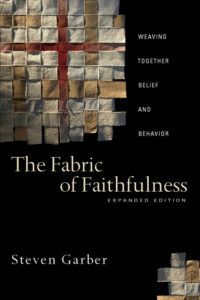
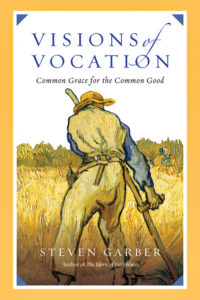 As I often do in presentations, I quote other authors (well there’s an understatement; I can almost hear my friends chuckling.) Quite regularly I quote or at least allude to Steve Garber. His Fabric of Faithfulness: Moving From Belief to Behavior (IVP; $19.00) is challenging but profound and such a great work; his Visions of Vocation: Common Grace for the Common Good (IVP; $17.00) remains one of my favorite books. In both exquisitely-written books he cites writers and novelists and artists. In Visions of Vocation Garber tells of an encounter with novelist Tom Wolfe (who was such a zesty non-fiction writer that he is credited with helping launch what is often called “the new journalism.”) When Wolfe died a week or two ago, Steve shared a tender piece on Facebook (that was somewhat similar to his telling in VoV.) It was too timely not to share.
As I often do in presentations, I quote other authors (well there’s an understatement; I can almost hear my friends chuckling.) Quite regularly I quote or at least allude to Steve Garber. His Fabric of Faithfulness: Moving From Belief to Behavior (IVP; $19.00) is challenging but profound and such a great work; his Visions of Vocation: Common Grace for the Common Good (IVP; $17.00) remains one of my favorite books. In both exquisitely-written books he cites writers and novelists and artists. In Visions of Vocation Garber tells of an encounter with novelist Tom Wolfe (who was such a zesty non-fiction writer that he is credited with helping launch what is often called “the new journalism.”) When Wolfe died a week or two ago, Steve shared a tender piece on Facebook (that was somewhat similar to his telling in VoV.) It was too timely not to share.
You see, I was inviting these Christian fiction writers not to be simplistic or preachy, to “tell it slant” and to – regardless of what the “inspirational market” wants – invite readers to grow up and into the truth of things as they really are. Southern Novelist Walker Percy famously talked about how bad books always lie and I proposed to these authors that they must tell the truth about this glorious, broken world of wonder, the good, the bad, the ugly. My friend Bill Mallonee, an Americana roots rocker, has an album called Slow Trauma and that gets at something very sad but true about life East of Eden. (Francis Schaeffer, decades ago, in his fine little book Art and the Bible talked about the minor and major themes of a Biblical worldview, sorrowful fallenness and hopeful redemption, and why we need both in honest art.) Art dare not be weighted with too much of a message or lesson lest it be mere propaganda; further, a cheap conversion episode that makes everything happy in the end is not good or true. And so, we must be careful with sentimental religiosity or cheap endings as if we have to shoe-horn some religious message into the story for it to be considered Christian enough.
But that does not mean that gifted writers dare not attempt to wisely plumb the very mysteries of Christian conversion. And so, as I invited these writers to work hard to become good enough writers to tell rich and nuanced and honest stories, I paraphrased what my friend Steve reported about his long conversation with Wolfe. Here, you can read it for yourself.
“I don’t finish my stories very well, do I?”
When I saw the news of Tom Wolfe’s death this morning, I immediately thought back to a conversation with him many years ago. We were at a small table in the Senator’s dining room of the U.S. Capitol, a politician, two journalists, and a professor, me always the professor at the table. And for a good hour and more we talked, asking questions about many things.
But along the way, I asked about his novel, “A Man in Full,” telling him that I had spent my week at the beach reading his story of “the last great white football player at Georgia Tech,” who had given his life to remaking the Atlanta skyline. Forty-plus years later he has become fabulously wealthy, with businesses all over America. It is a long book, and I won’t even try to summarize it here, only to say that I thought he “cheated” at the end. In the story he makes clear that Stoicism is not a sufficient answer for human beings who want to live into history, seeing and hearing and feeling the world. At a critical point in the book, he makes that dramatically clear. But then the last pages are given to a warmed-over Stoicism, as some kind of answer for being and becoming “a man in full.”
So, with the great American novelist at the table, I told him that I was drawn into the story until the very end…. and he looked at me, with honest eyes, “I don’t finish my novels very well, do I?”
We talked some more, and he said, “I thought of a Christian conversion, but that’s already been done.” Anyone who knows me knows that I do not require “a Christian conversion” to believe that someone has a written a good story. I am always willing to read a book that wrestles with the truth of the human condition. But I am also aware that some of the very best books we know— “Crime and Punishment” and “Les Miserables,” for example —have a Christian conversion at the heart of their stories. Raskolnikov and Jean Valjean are names for the ages because of the complexity of their characters, human beings torn between the glory and the ruin of the human heart— and on the pilgrimages of their lives as told by Dostoevsky and Hugo, we see them humbled before the God of heaven and earth, finding great grace.
When we finished the conversation, I wanted to take a long walk across the Capitol grounds, continuing to talk with Wolfe. There seemed an openness and tenderness, and I wanted to know more.
And now he knows more… Lord, be merciful to all of us.
BookNotes

SPECIAL
DISCOUNT
ANY ITEM MENTIONED
20% Off
order here
this takes you to the secure Hearts & Minds order form page
just tell us what you want
inquire here
if you have questions or need more information
just ask us what you want to know
Hearts & Minds 234 East Main Street Dallastown PA 17313
read@heartsandmindsbooks.com
717-246-3333
